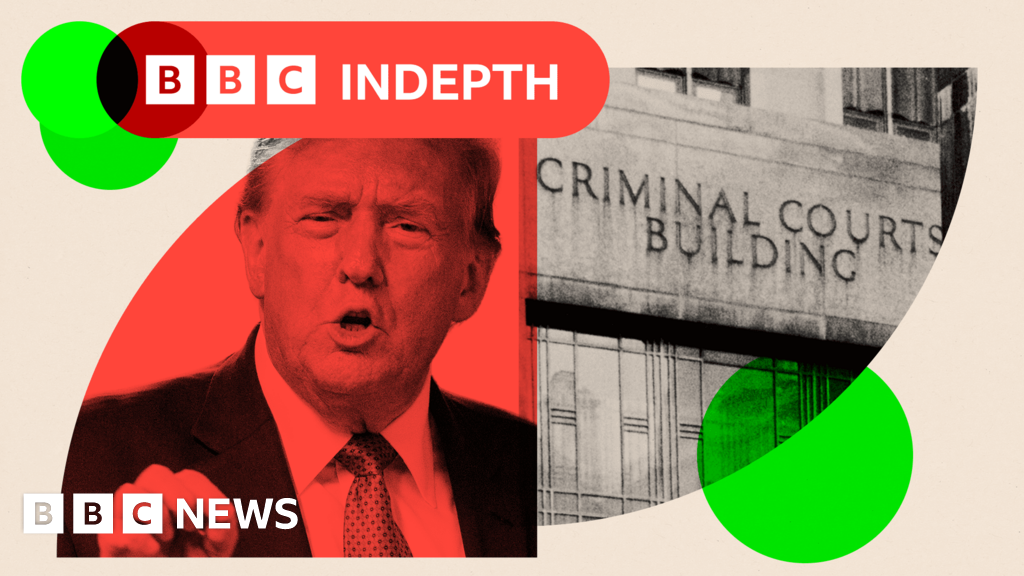
John Sudworth ,Senior North America correspondent, in New York
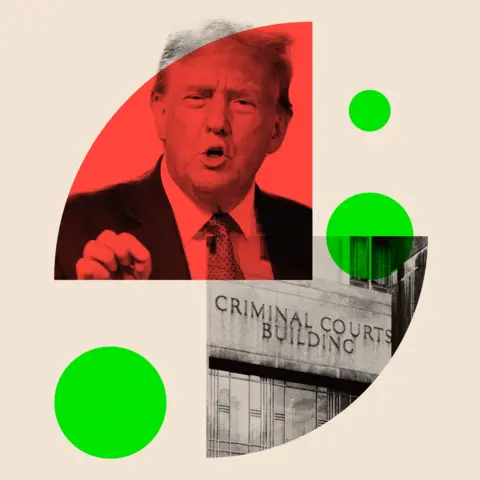 Getty Images
Getty ImagesIt had all the promise of an only-in-America blockbuster trial, brimming with salacious detail and a former president in the dock.
In fact, it’s hard to imagine a bigger courtroom drama, tailor-made for the media, than one that stars Donald Trump, once the world’s most powerful figure and someone vying to be so again, forced to sit through allegations of an awkward sexual encounter with a porn actress.
A political and legal thriller in which a man – not known for his humility – has had to listen, often with eyes tightly shut, as everything from depictions of his satin pyjamas and comparisons to a “Cheeto-dusted cartoon villain” have entered the court record.
And yet, despite the weeks of testimony, the millions of pages of documents, and the ranks of live TV cameras assembled outside to record the history-making spectacle of the first criminal trial of a former US leader, the American public appears strangely detached.
In a recent YouGov/Yahoo News poll, just 16% of respondents said they’d been following the trial “very closely”, with even those who said they were taking a mild interest in proceedings coming in at only a third of those surveyed.
More Americans said the trial made them feel “bored” or “angry” than interested. Other polls taken during the trial to gauge attention being paid have found similar results.
As the jury’s verdict now approaches, for those pundits and pollsters once anticipating that a national moment might be unfolding in lower Manhattan’s criminal courtroom number 1530, there’s now instead a feeling that the outcome – whichever way it goes – may be less of a fulmination and more of a fizzle.
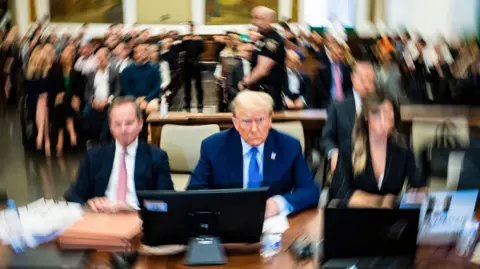 EPA
EPATrump has always denied that he had sex with Stormy Daniels – real name Stephanie Clifford – and his lawyers have attempted to portray her in court as a fabricator.
She used her notoriety from the allegation, they argued, to make money – including from a range of merchandise, with even a “Stormy, saint of indictments” candle.
In one of the most memorable exchanges from the trial, Trump defence attorney Susan Necheles said that the porn star had “a lot of experience making phony stories about sex appear real”.
“Wow,” Ms Daniels shot back. “The sex in those films is very much real – just like in that hotel room,” she continued, adding that, if the story were made up, she would have “written it to be a lot better”.
She painted a picture of a presuming Mr Trump opening the door to his hotel room in his pyjamas, undressing to his underwear while she used the bathroom, and then an unprotected, unexpected encounter which, she said, left her shaking and desperate to leave.
On the face of it, however, the case was never really about what did, or didn’t, happen in that golf resort hotel room.
Instead, the crime was allegedly committed in the effort to cover the story up.
Shortly before the 2016 election, Ms Daniels was paid $130,000 dollars for her silence by Michael Cohen, Mr Trump’s close confidante, lawyer and fixer, for the purpose – the prosecution argued – of improperly keeping the story from the voting public.
With the election looming, they claimed, the Trump campaign was already reeling from the release of the “Access Hollywood” tape, which showed their candidate boasting that his fame allowed him to do anything he wanted to women, including grabbing them by the genitals.
Ms Daniels’ coming forward with her story would have caused further damage. The timing, in the prosecution’s telling, explains why there was a pressing need for the Trump campaign to buy Stormy Daniels’ silence.
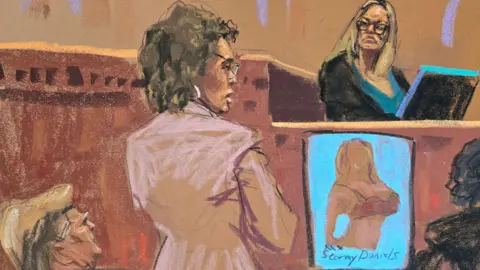 Reuters
ReutersThere are some who see the public’s seeming indifference to the case as not as surprising as it may appear.
Firstly, Donald Trump is already a known quantity with a long history of courting outrage. Infamy is part of the brand and perceptions of whether he has committed wrongdoing divide on sharply political lines.
And secondly, the American voter is far less prudish than many assume, a point brought home by another sexual scandal from a different political age.
Bill Galston had a senior policy role inside Bill Clinton’s White House and is now a senior fellow at the Brookings Institution.
“If you’re asking me if I’m acquainted with sex scandals in or near the Oval Office, then I certainly am,” he tells me.
There are resonances, he says, between the Trump trial today and the allegations against the then President Clinton in the late 1990s that he lied to cover up a sex scandal with White House intern Monica Lewinsky.
“I was involved in intense discussions on both sides of the political aisle,” Mr Galston says. “And people were wondering, where was the outrage?”
Polls at the time are remarkably similar to those of the present, with only 15% of the public saying they were watching Mr Clinton’s televised impeachment trial closely, and a little more than a third saying they were watching “some of it”.
That’s neck-and-neck with polling around the Trump trial, which by contrast hasn’t been televised.
Bill Clinton was acquitted by the US Senate. So, might Donald Trump also be getting a similar pass, if not from the US criminal justice system, then from the American people?
“Some Americans might be watching and saying, ‘well, he lied about sex and just how new is that anyway?’,” Mr Galston suggests.
“One of the long historical arcs here has been the normalisation of sins that previously would’ve been considered mortal.”
Far from having US voters glued to every detail, the centrality of the sexual allegations and the salacious nature of the case may be precisely the reason that they seem disinterested.
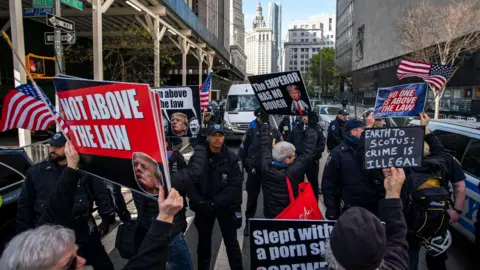 Reuters
ReutersWe can add to all that the widely held view that the Manhattan trial is by far the weakest of the four criminal cases Donald Trump faces.
It is built on a bookkeeping offence – the alleged falsification of reimbursements to Michael Cohen – the man who paid off Stormy Daniels – as legal fees rather than as hush-money payments.
The case relies on what would ordinarily be a misdemeanour being elevated to the more serious category of felony because of the alleged attempt to improperly influence an election.
Legal views are sharply divided about its merits and chances of success.
And it’s hard to escape at least the perception of a political element – always a danger with America’s system of elected prosecutors – given that the man bringing the case, Manhattan District Attorney Alvin Bragg, openly campaigned on his record of taking on Mr Trump in the courts.
Even Mr Galston, the former Clinton White House insider, says “you’d have to be very obtuse” to deny that there’s a whiff of partisanship.
It is a concern that Mr Trump has been exploiting to the full, making daily speeches from the steps of the courthouse alleging he is the victim of authoritarian persecution. And this, of course, from a man who tried to overturn the results of the 2020 election and who continues to make false claims of election fraud.
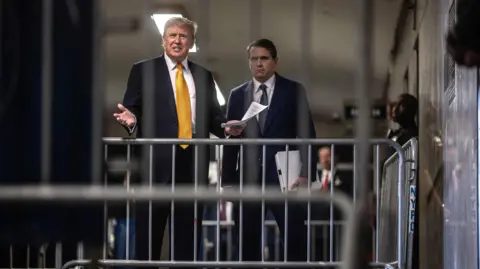 Reuters
ReutersIf there is a kind of national moment in any of this, it might simply be the dawning realisation that Donald Trump’s political momentum is unlikely to be checked by the legal system. The New York hush-money case is the only one of his four criminal cases likely to be tried before the 5 November election.
The most serious cases against him – those involving the January 6 riot at the US Capitol and his retention of classified documents – are mired in legal challenges brought his lawyers.
Instead, there’s just this one case, heavy on sexual scandal and built on a complex legal argument that, win or lose, Mr Trump will try to spin to his political advantage. An acquittal will be proof the whole thing was a “witch-hunt”; a conviction will make him a martyr among his supporters.
And while there is some polling that suggests that at least some Trump supporters may hesitate to vote for a convict, you have to wonder why a guilty verdict on felony bookkeeping charges would finally be a bridge too far for any of his loyal base.
With the verdict looming, Mr Trump held a rally on Thursday in the Bronx, a New York borough where more than 80% of residents are black or hispanic.
It’s one of the most Democratic constituencies in America, but for the locals who did turn out in the requisite MAGA hats there was evidence of the same fervent passion for their candidate’s norm-bending approach.
Bronx-born-and-bred Rojah Watson, a doorman who works in Manhattan, told me that Mr Trump’s threats to use a second term to bend the US justice department to his will, prosecute Joe Biden and pardon January 6 rioters were part of the attraction.
“I think that’s cleaning house,” he said. “That’s just the way it’s got to be.”
When asked if it was a strongman leader he was seeking, he replied: “Yes, absolutely.”
TK, who sported a hat with the word TRUMP emblazoned on it, agreed.
“The justice system is already screwed” she insisted. “I don’t want him to be, say, like a dictator. But you’ve got to sometimes assert yourself.”
Would a criminal conviction make her think twice?
“No,” she replied. “These charges they’re bringing on him about Stormy, that’s his personal life. Get out of his personal life.”
The great irony of this trial is that the hush-money payment turned out to be anything but, and Stormy Daniels’ story is now written into political and legal history.
As a result, 12 ordinary men and women in a humdrum New York courtroom will soon stand in judgement on a man with immense wealth and power and their verdict – guilty, innocent or mistrial – could yet have unforeseen consequences.
But will the turning of the wheels of justice humble Mr Trump? It seems unlikely.
For many of his supporters, the disruptive danger he presents to the fabric of the US political system is not an allegation they dispute. It’s part of the attraction.
BBC InDepth is the new home on the website and app for the best analysis and expertise from our top journalists. Under a distinctive new brand, we’ll bring you fresh perspectives that challenge assumptions, and deep reporting on the biggest issues to help you make sense of a complex world. And we’ll be showcasing thought-provoking content from across BBC Sounds and iPlayer too. We’re starting small but thinking big, and we want to know what you think – you can send us your feedback by clicking on the button below.

